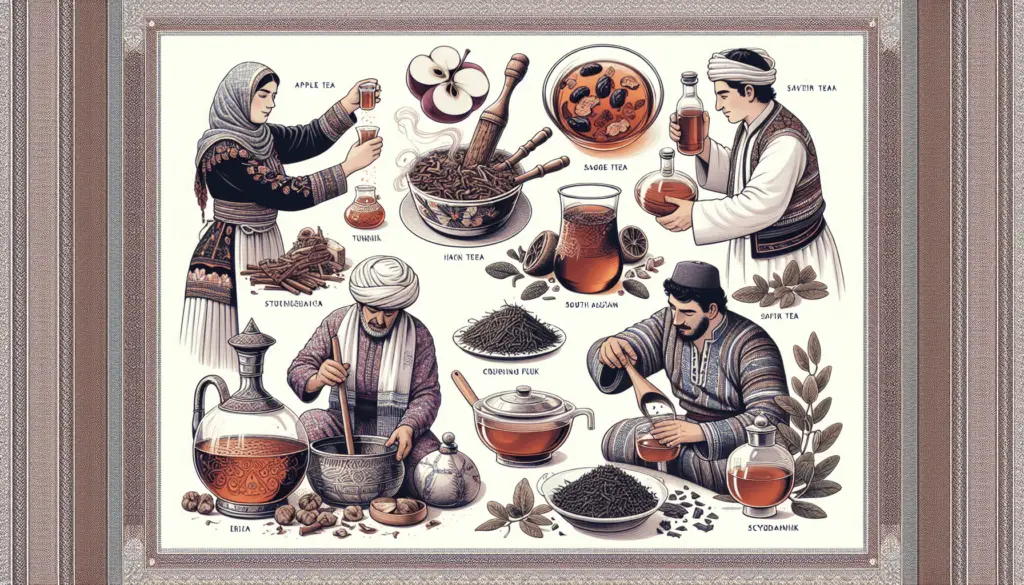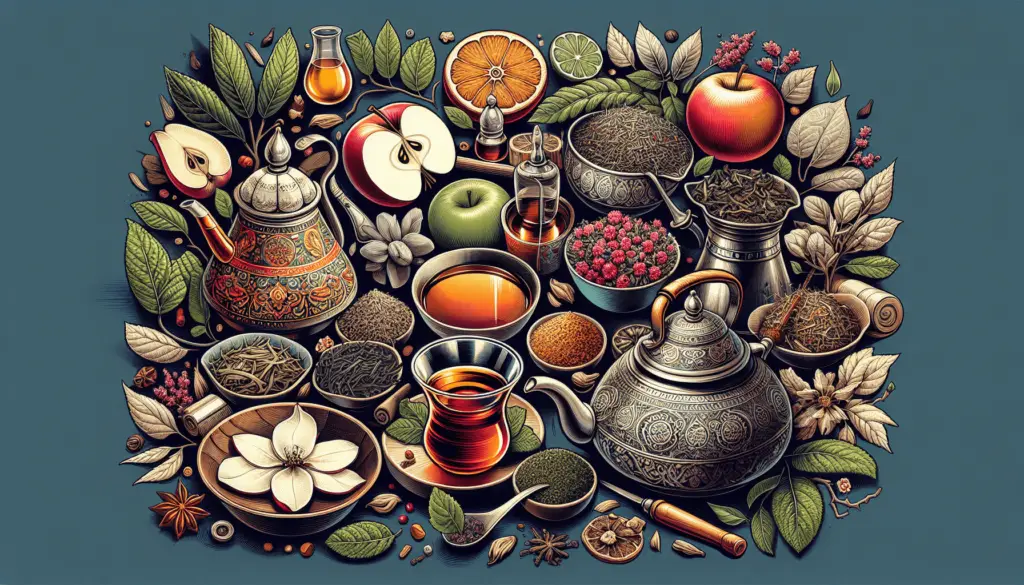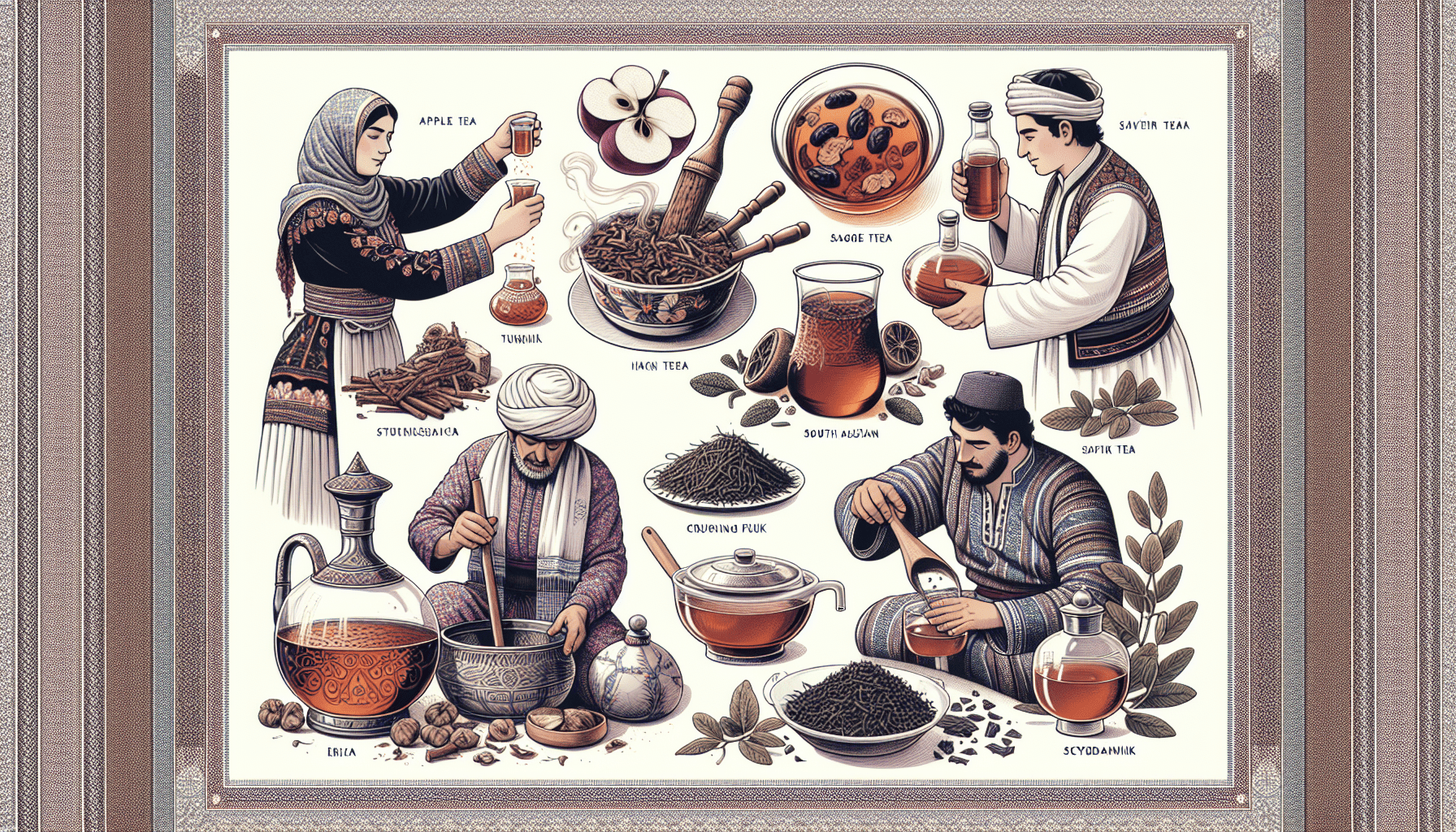If you want to explore the vibrant and diverse world of Turkish teas, you’ve come to the right place! In this article, we’ll take you on a delightful journey through the flavors and traditions of traditional and herbal Turkish teas. From the timeless classics like çay to the exotic blends of herbal infusions, you’ll discover the fascinating culture behind each cup. So, grab your favorite mug and get ready to sip your way into the heart of Turkish tea.
Traditional Turkish Teas
Turkey is renowned for its rich tea culture, and traditional Turkish teas are at the heart of this cultural phenomenon. Whether you’re a tea aficionado or just looking to explore new flavors, you’re in for a treat with a cup of traditional Turkish tea. Let’s delve into the world of Turkish teas and discover the delightful options that await you.
Black Tea
Black tea, also known as çay, is the most beloved and widely consumed traditional Turkish tea. It is robust, aromatic, and has a deep reddish-brown color. Turkish black tea is typically made using two stacked kettles, one filled with boiling water and the other with loose tea leaves. The rich and full-bodied flavor of black tea makes it a perfect companion for breakfast or any time you need a warm and energizing pick-me-up.
Apple Tea
Apple tea, or elma çayı, is a popular fruity alternative to black tea. Made from dried apple slices, this tea has a naturally sweet and slightly tangy flavor. It is often enjoyed as a refreshing cold drink during the hot summer months or as a soothing warm beverage during winter. The vibrant golden color and refreshing taste of apple tea make it a delightful choice for those seeking a lighter and fruitier tea option.
Sage Tea
Sage tea, known as ada çayı, is a herbal tea made from the leaves of the sage plant. It has a subtle earthy flavor with a hint of mint and a pleasant aroma. Sage tea is not only delicious but also known for its various health benefits. It is believed to aid digestion, soothe sore throats, and provide relief from common cold symptoms. Whether you’re looking to enjoy the taste or reap the herbal benefits, a cup of sage tea is a wonderful choice.
Herbal Turkish Teas
If you’re looking to explore beyond the traditional black tea, Turkish herbal teas offer a plethora of flavors and health benefits. These teas are made from various herbs and plants, each with its unique taste and properties. Let’s explore some popular herbal teas in Turkish culture.
Linden Tea
Linden tea, also known as ıhlamur çayı, is a fragrant and soothing herbal tea made from the dried flowers of the linden tree. It has a mild and slightly sweet taste with hints of honey and citrus. In addition to its refreshing flavor, linden tea is commonly used for its calming effects. It is believed to promote relaxation, relieve stress and anxiety, and even aid in sleep. Sip on a cup of linden tea to unwind and rejuvenate.
Chamomile Tea
Chamomile tea, or papatya çayı, is well-known for its calming properties. Made from dried chamomile flowers, this tea has a delicate aroma and a subtle, apple-like flavor. It is often consumed before bedtime to promote relaxation and alleviate insomnia. Chamomile tea is also known to aid digestion and soothe stomach discomfort. Whether you’re looking for a soothing cup in the evening or seeking relief from digestive issues, chamomile tea is a popular choice.
Rosehip Tea
Rosehip tea, or kuşburnu çayı, is a vibrant and tangy herbal tea made from the fruit of the wild rose plant. It has a pleasantly tart taste with a hint of natural sweetness. Rich in vitamin C and antioxidants, rosehip tea is known to boost the immune system and support overall health. It is also believed to have anti-inflammatory properties and may help with joint pain and arthritis. Savor the refreshing flavor and reap the health benefits with a cup of rosehip tea.

Traditional Turkish Tea Culture
Turkish tea culture is deeply ingrained in the daily lives of Turkish people. It is a social ritual that brings together friends, family, and even strangers. Understanding the tea drinking rituals and serving etiquette is essential to fully embrace the Turkish tea culture.
Tea Drinking Rituals
In Turkish culture, tea is a symbol of hospitality, friendship, and warmth. It is customary to welcome guests with a cup of tea, and offering tea is seen as a gesture of kindness and generosity. Turkish tea is traditionally served in small, tulip-shaped glasses called “çay fincanı.” To fully experience the tea, take small sips and enjoy the conversation and company.
Tea Serving Etiquette
When serving Turkish tea, it is customary to pour tea with a generous foam called “köpük.” This foam is a sign of a well-brewed tea and adds a unique texture and depth to the taste. The host often offers refills throughout the gathering, ensuring that no one’s glass is empty. Remember to hold the tea glass by the rim or the bottom handle to avoid burning your fingers. Embrace the Turkish tea culture by practicing the art of tea serving with grace and hospitality.
Health Benefits of Turkish Teas
Turkish teas are not only delicious but also offer a range of health benefits. From their antioxidant properties to their digestive aid and immune-boosting effects, Turkish teas can be a great addition to your wellness routine.
Antioxidant Properties
Both traditional and herbal Turkish teas are rich in antioxidants, which help protect the body against free radicals and oxidative stress. The antioxidants found in tea are known to have potential anti-aging effects and promote overall health and well-being. By incorporating Turkish teas into your daily routine, you can enjoy a natural source of antioxidants that nourish your body from within.
Digestive Aid
Many Turkish herbal teas, such as chamomile and sage tea, have been traditionally used to aid digestion. These teas are known for their ability to soothe stomach discomfort, relieve bloating, and promote digestive health. Enjoying a cup of tea after a meal can not only enhance your dining experience but also support your digestive system.
Immune Booster
Turkish herbal teas, particularly rosehip tea, are packed with vitamin C and other immune-boosting compounds. Vitamin C is essential for maintaining a strong immune system and protecting the body against illnesses. By incorporating Turkish teas into your routine, you can give your immune system a natural boost and enhance your overall well-being.

Preparing Traditional Turkish Teas
To fully appreciate the flavors of traditional Turkish teas, it’s important to understand the proper techniques for preparation. From water temperature and brewing time to the choice between a tea percolator and a samovar, these factors can significantly impact the taste of your tea.
Water Temperature and Brewing Time
The traditional method of brewing Turkish tea involves the use of a çaydanlık, a two-tiered tea kettle. The lower kettle is filled with water and brought to a boil, while the upper kettle contains loose tea leaves. Once the water reaches a rolling boil, it is poured over the tea leaves and allowed to steep for a few minutes. The steeping time varies depending on personal preference, with some preferring a strong and robust brew, while others opt for a milder taste. Experiment with different brewing times to find your desired flavor profile.
Tea Percolator vs. Samovar
In addition to the traditional brewing method, Turkish teas can also be prepared using a tea percolator or a samovar. A tea percolator allows you to brew tea using a more modern approach, similar to that of a coffee maker. Samovars, on the other hand, are traditional tea urns that keep the tea hot for an extended period. These two methods offer convenience and flexibility, especially when serving tea to a larger group of people. Choose the preparation method that suits your preferences and enjoy a perfectly brewed cup of Turkish tea.
Best Time to Enjoy Turkish Teas
Turkish teas are not only delicious on their own, but they also pair exceptionally well with various foods and create memorable experiences. Here are some suggestions for the best times to enjoy Turkish teas.
Afternoon Tea Time
In Turkish culture, afternoon tea time is a cherished tradition. It is a time to relax, unwind, and enjoy a delicious cup of tea accompanied by delectable pastries, such as baklava, börek, or Turkish delight. The combination of the aromatic tea and the indulgent treats creates a truly delightful experience. Gather your loved ones or find a cozy spot in a café, and let the afternoon tea time transport you to a world of Turkish delight.
Relaxing Evening Tea
As the sun sets and the day winds down, a relaxing evening tea can be just what you need to unwind and rejuvenate. Pair your tea with a selection of cheese and traditional Turkish bread, such as simit or pide, for a delightful evening snack. The warm and comforting flavors of the tea combined with the savory and satisfying bites will create a perfect ending to your day.
Pairing Turkish Teas with Food
Turkish teas are not only enjoyable on their own but also complement a wide range of foods. Whether you’re looking for a sweet treat or a savory delight, Turkish teas have the versatility to enhance your culinary experience.
Sweets and Pastries
Turkish teas, especially black tea, are often enjoyed with a variety of sweets and pastries. Delicate desserts like Turkish delight, baklava, and revani perfectly balance the robust flavors of the tea. The combination of the sweet, sticky textures and the aromatic tea creates a harmonious blend of flavors. Indulge in the traditional Turkish tea experience by pairing it with these mouthwatering treats.
Cheeses and Breads
For a savory experience, Turkish teas can be paired with a selection of cheeses and breads. Soft, creamy cheeses like beyaz peynir or tulum cheese with their mild flavors pair beautifully with black tea. Enjoy them with freshly baked bread or crusty Turkish bagels called “simit” for a satisfying and flavorful snack. The contrasting tastes and textures bring a delightful balance to your tea experience.
Buying and Storing Turkish Teas
When it comes to buying and storing Turkish teas, a little knowledge goes a long way. Understanding how to choose the right tea and properly store it ensures that you get the best flavors and aromas from your teas.
Choosing the Right Tea
When buying Turkish teas, opt for high-quality products from reputable brands. Look for teas that are sourced from trusted sources and have a robust flavor and aroma. Consider trying different varieties to explore the diverse flavors and find your personal favorites. Whether you prefer the rich taste of black tea or the soothing properties of herbal teas, there is a Turkish tea out there for every palate.
Proper Tea Storage
To maintain the freshness and quality of your Turkish teas, it is essential to store them correctly. Keep your teas in airtight containers away from direct sunlight, moisture, and strong odors. This helps preserve the flavors and prevent the tea from absorbing unwanted aromas. Additionally, storing different types of teas separately can prevent flavor contamination. A cool, dry pantry or cupboard is an ideal place to store your teas and ensure they stay fresh and delicious for longer.
Popular Brands of Turkish Teas
When it comes to Turkish teas, several renowned brands have established themselves as leaders in the industry. Let’s explore some popular brands that offer a wide range of authentic and high-quality Turkish teas.
Caykur
Caykur is one of the largest and most well-known tea producers in Turkey. With a history dating back to 1944, this brand has become synonymous with Turkish tea. Caykur offers a wide range of black, herbal, and fruit teas, ensuring there is a tea for every taste and preference. The teas are carefully cultivated in Turkey’s lush tea gardens and packaged with utmost care to maintain their freshness.
Hafiz Mustafa
Hafiz Mustafa is a renowned Turkish brand that specializes in a variety of confectionery and tea products. With a commitment to quality and tradition, Hafiz Mustafa offers a selection of exquisite Turkish teas that are crafted to perfection. Each tea blend is created using the finest ingredients, ensuring a memorable tea-drinking experience. Hafiz Mustafa teas are loved not only in Turkey but also by tea enthusiasts around the world.
Dogus
Dogus is another well-established brand that has been producing Turkish teas for over 60 years. With a passion for tea and a commitment to excellence, Dogus offers a wide range of teas that cater to diverse tastes and preferences. From traditional black tea to herbal infusions, Dogus teas are known for their rich flavors, enticing aromas, and exceptional quality. Indulge in the flavors of Dogus teas and embrace a true Turkish tea experience.
Exploring Turkish Tea Houses
To fully embrace the Turkish tea culture, a visit to a traditional Turkish tea house is a must. These tea houses, known as “çay bahçesi,” are vibrant and bustling hubs where people gather to socialize, relax, and enjoy their favorite teas. Let’s explore some famous tea houses in Istanbul that offer an authentic Turkish tea experience.
Famous Tea Houses in Istanbul
- Çorlulu Ali Paşa Medresesi: Nestled in the historic neighborhood of Eminönü, this tea house offers a serene ambiance with its enchanting courtyard and traditional Ottoman architecture. Sip on a cup of Turkish tea while admiring the beautiful surroundings and soaking in the Turkish tea culture.
- Pierre Loti: Perched atop a hill in Eyüp, this tea house offers panoramic views of the Golden Horn and the historic peninsula. With its charming atmosphere and delicious tea, Pierre Loti is a popular spot for locals and tourists alike. Enjoy a cup of tea and immerse yourself in the breathtaking scenery.
- Mavra Café and Lounge: Located in the trendy neighborhood of Karaköy, this modern tea house offers a contemporary twist to the traditional Turkish tea experience. With its stylish decor and innovative tea blends, Mavra Café and Lounge is the perfect place to discover new flavors and enjoy a relaxing tea session.
Authentic Tea House Experience
Visiting a traditional Turkish tea house not only allows you to taste the unique flavors of Turkish teas but also offers an immersive cultural experience. You can witness the art of tea brewing, engage in conversations with locals, and immerse yourself in the vibrant and lively atmosphere. Whether you choose a historic tea house or a modern café, the Turkish tea house experience is sure to leave you with unforgettable memories.
In conclusion, traditional and herbal Turkish teas offer a delightful journey into the fascinating world of Turkish tea culture. Whether you choose to savor the robust flavors of black tea or immerse yourself in the calming properties of herbal teas, Turkish teas are sure to captivate your senses. From tea drinking rituals and serving etiquette to the health benefits and preparation techniques, exploring Turkish teas is a comprehensive experience. So, grab a cup of Turkish tea, sit back, and let the flavors and aromas transport you to the enchanting land of Turkey.

